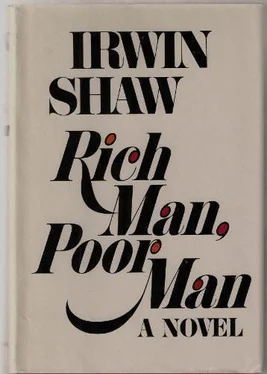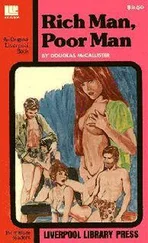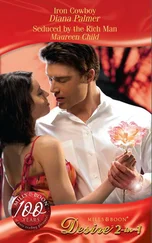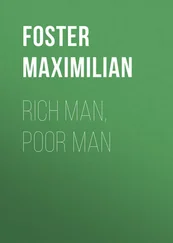His mother was in the bakery, behind the counter, with a shawl around her shoulders, because she was always cold. The building was on a corner, so there were two big windows and his mother kept complaining that with all that glass there was no way of keeping the shop warm. She was putting a dozen hard rolls in a brown paper bag for a little girl. There were cakes and tarts displayed in the front window, but they were no longer baked in the cellar. At the start of the war, his father, who did the baking, had decided that it was more trouble than it was worth and now a truck from a big commercial bakery stopped every morning to deliver the cakes and pastries and Axel confined himself to baking the bread and rolls. When pastries had remained in the window three days, his father would bring them upstairs for the family to eat. Rudolph went in and kissed his mother and she patted his cheek. She always looked tired and was always squinting a little, because she was a chain smoker and the smoke got into her eyes.
‘Why so early’ she asked.
‘Short practice today,’ he said. He didn’t say why. ‘I’ll take over here. You can go upstairs now.’
‘Thank you,’ she said. ‘My Rudy.’ She kissed him again. She
was very affectionate with him. He wished she would kiss his brother or sister once in a while, but she never did. He had never seen his mother kiss his father.
‘I’ll go and make dinner,’ she said. She was the only one in the family who called supper dinner. Rudolph’s father did the shopping, because he said his wife was extravagant and didn’t know good food from bad, but most of the time she did the cooking.
She went out the front door. There was no door that opened directly from the bakery to the hallway and the staircase that led up to the two floors above, where they lived, and he saw his mother pass the window, framed in pastry and shivering as the wind hit her. It was hard for him to remember that she was only a little over forty years old. Her hair was greying and she shuffled like an old lady.
He got out a book and read. It would be slow in the shop for another hour. The book he was reading was Burke’s speech On Conciliation With the Colonies, for his English class. It was so convincing that you wondered how all those supposedly smart men in Parliament hadn’t agreed with him. What would America have been like if they had listened to Burke? Would there have been earls and dukes and castles? He would have liked that. Sir Rudolph Jordache, Colonel in the Port Philip Household Guards.
An Italian labourer came in and asked for a loaf of white bread. Rudolph put down Burke and served him.
The family ate in the kitchen. The evening meal was the only one they all ate together because of the father’s hours of work. They had lamb stew tonight. Despite rationing, they always had plenty of meat because Rudolph’s father was friendly with the butcher, Mr Haas, who didn’t ask for ration tickets because he was German, too. Rudolph felt uneasy about eating black market lamb on the same day that Henry Fuller had found out his brother had been killed, but all he did about it was ask for a small portion, mostly potatoes and carrots, because he couldn’t talk to his father about fine points like that. His brother, Thomas, the only blonde in the family, besides the mother, who really couldn’t be called blonde any more, certainly didn’t seem to be worried about anything as he wolfed down his food. Thomas was just a year younger than Rudolph, but was already as tall and much stockier than his brother. Gretchen, Rudolph’s older sister, never ate much, because she worried about her weight. His mother just picked at
her food. His father, a massive man in shirtsleeves, ate enormously, wiping his thick, black mustache with the back of his hand from time to time.
Gretchen didn’t wait for the three-day-old cherry pie that they had for dessert, because she was due at the Army hospital just outside town where she worked as a volunteer nurse’s aid five nights a week. When she stood up, the father made his usual joke. ‘Be careful,’ he said. ‘Don’t let those soldiers grab you. We don’t have enough rooms in this house to set up a nursery.’
‘Pa,’ Gretchen said reproachfully.
‘I know soldiers,’ Axel Jordache said. ‘Just be careful.’
Gretchen was a neat, proper, beautiful girl, Rudolph thought, and it pained him that his father talked like that to her. After all she was the only one in the family who was contributing to the war effort.
When the meal was over, Thomas went out, too, as he did every night. He never did any homework and he got terrible marks in school. He was still a freshman in the high school, although he was nearly sixteen. He never listened to anybody.
Axel Jordache went into the livingroom up front to read the evening newspaper before going down to the cellar for the night’s work. Rudolph stayed in the kitchen to dry the dishes after his mother had washed them. If I ever get married, Rudolph thought, my wife will not have to wash dishes.
When the dishes were done, the mother got out the ironing board and Rudolph went upstairs to the room he shared with his brother, to do his homework. He knew that if ever he was going to escape from eating in a kitchen and listening to his father and wiping dishes it was going to be through books, so he was always the best prepared student in the class for all examinations.
Maybe, Axel Jordache thought, at work in the cellar, I ought to put poison in one of them. For laughs. For anything. Serve hem right. Just once, just one night. See who gets it
He drank the blend straight out of the bottle. By the end of the night the bottle would be almost gone. There was flour all the way up to his elbows and flour on his face, where he had wiped away the sweat. I’m a goddamn clown, he thought, without a circus.
The window was open to the March night and the weedy Rhenish smell of the river soaked into the room, but the oven was cooking the air in the basement. I am in hell, he thought, I stoke the fires of hell to earn my bread, to make my bread. I am in hell making Parker House rolls.
He went to the window and took a deep breath, the big chest muscles, age-ridged, tightening against his sweaty skivvy shirt. The river a few hundred yards away, freed now of ice, carried the presence of North with it like the rumour of passing troops, a last cold marching threat of winter, spreading on each of its banks. The Rhine was four thousand miles away. Tanks and cannon were crossing it on improvised bridges. A lieutenant had run across it when a bridge had failed to blow up. Another lieutenant on the other side had been court-martialled and shot because he had failed to blow the bridge as ordered. Armies. Die Wacht am Rhein. Churchill had pissed in it recently. Fabled river. Jordache’s native water. Vineyards and sirens. Schloss Whatever. The cathedral in Cologne was still standing. Nothing much else. Jordache had seen the photographs in the newspapers. Home sweet home in old Cologne. Bulldozed ruins with the ever-remembered stink of the dead buried under collapsed walls. It couldn’t have happened to a nicer city. Jordache thought of his youth and spat up and out of the window in the direction of the other river. The invisible German Army. How many dead? Jordache spat again and licked his black moustache that dropped down at the corners of his mouth. God bless America. He had killed to get there. He took one last breath of the river’s presence and limped back to work.
His name was on view on the window of the shop above the’ basement. BAKERY, A. Jordache, Pro. Twenty years ago, when the sign had been put up, it had read A. Jordache, Prop., but one winter the p had fallen off and he hadn’t bothered to have it put back on. He sold just as many Parker House rolls without the p.
Читать дальше











